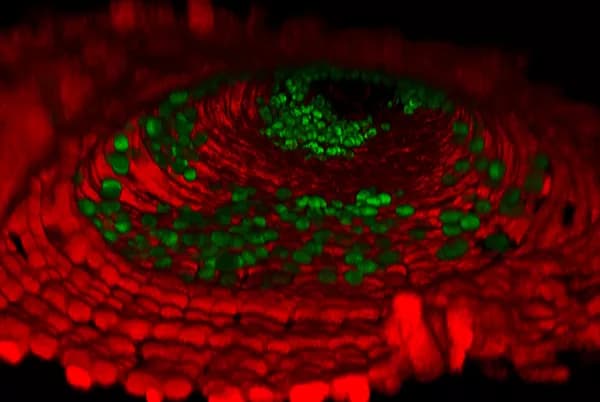
Stopping Tumor Cells Killing Surrounding Tissue May Provide Clue To Fighting Cancer
Tumours kill off surrounding cells to make room to grow, according to new research from the University of Cambridge. Although the study was carried out using fruit flies, its findings suggest that drugs to prevent, rather than encourage, cell death might be effective at fighting cancer – contrary to how many of the current chemotherapy drugs work.
The idea that different populations of cells compete within the body, with winners and losers, was discovered in the 1970s and is thought to be a ‘quality control’ mechanism to rid the tissue of damaged or poorly-performing cells. With the discovery that genes involved in cancer promote this process, scientists have speculated that so-called ‘cell competition’ might explain how tumours grow within our tissues.
Now, researchers at the Wellcome Trust/Cancer Research UK Gurdon Institute, University of Cambridge, have used fruit flies genetically manipulated to develop intestinal tumours to show for the first time that as the tumour grows and its cells proliferate, it kills off surrounding healthy cells, making space in which to grow. The results of the study, funded by Cancer Research UK, are published in the journal Current Biology.
Dr Eugenia Piddini, who led the research, believes the finding may answer one of the longstanding questions about cancer. “We know that as cancer spreads through the body – or ‘metastasises’ – it can cause organ failure,” she says. “Our finding suggests a possible explanation for this: if the tumour kills surrounding cells, there will come a point where there are no longer enough healthy cells for the organ to continue to function.”
The cancer cells encourage a process known as apoptosis, or ‘cell death’, in the surrounding cells, though the mechanism by which this occurs is currently unclear and will be the subject of further research.
By manipulating genetic variants within the surrounding cells to resist apoptosis, the researchers were able to contain the tumour and prevent its spread. This suggests drugs that carry out the same function – inhibiting cell death – may provide an effective way to prevent the spread of some types of cancer. This is counter to the current approach to fighting cancer: most current drugs used in chemotherapy encourage cell death as a way of destroying the tumour, though this can cause ‘collateral damage’ to healthy cells, hence why chemotherapy patients often become very sick during treatment.
In fact, some drugs that inhibit cell death are already being tested in clinical trials to treat conditions such as liver damage; if proven to be safe, they may provide options for potential anti-cancer drugs. However, further research is needed to confirm that this approach will be suitable for treating cancer.
“It sounds counterintuitive not to encourage cell death as this means you’re not attacking the tumour itself,” says Dr Eugenia Piddini. “But if we think of it like an army fighting a titan, it makes sense that if you protect your soldiers and stop them dying, you stand a better chance of containing – and even killing – your enemy.”
The work, which was carried out by postdoctoral researcher Saskia Suijkerbuijk and colleagues in the Piddini group, used fruit flies because they are much simpler organisms to study than mammals; however, many of the genes being studied are conserved across species – in other words, the genes, or genes with an identical or very similar function, are found in both the fruit fly and mammals.
Dr Alan Worsley, senior science information officer at Cancer Research UK, said: “Tumours often need to elbow healthy cells out of the way in order to grow. This intriguing study in fruit flies suggests that if researchers can turn off the signals that tell healthy cells to die, they could act as a barrier that boxes cancer cells in and stunts their growth. We don’t yet know if the same thing would work in patients, but it highlights an ingenious new approach that could help to keep early stage cancers in check.”
The above post is reprinted from materials provided by University of Cambridge. The original story is licensed under a Creative Commons Licence. Note: Materials may be edited for content and length.
Disclaimer: DoveMed is not responsible for the adapted accuracy of news releases posted to DoveMed by contributing universities and institutions.
Primary Resource:
Suijkerbuijk, S. J., Kolahgar, G., Kucinski, I., & Piddini, E. (2016). Cell Competition Drives the Growth of Intestinal Adenomas in Drosophila. Current Biology.
Related Articles
Test Your Knowledge
Asked by users
Related Centers
Related Specialties
Related Physicians
Related Procedures
Related Resources
Join DoveHubs
and connect with fellow professionals

0 Comments
Please log in to post a comment.